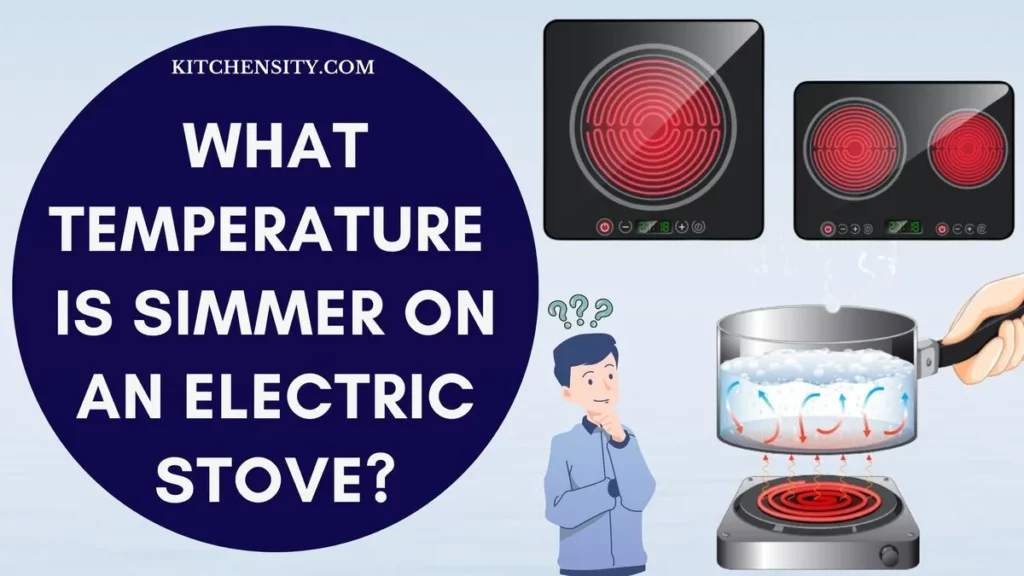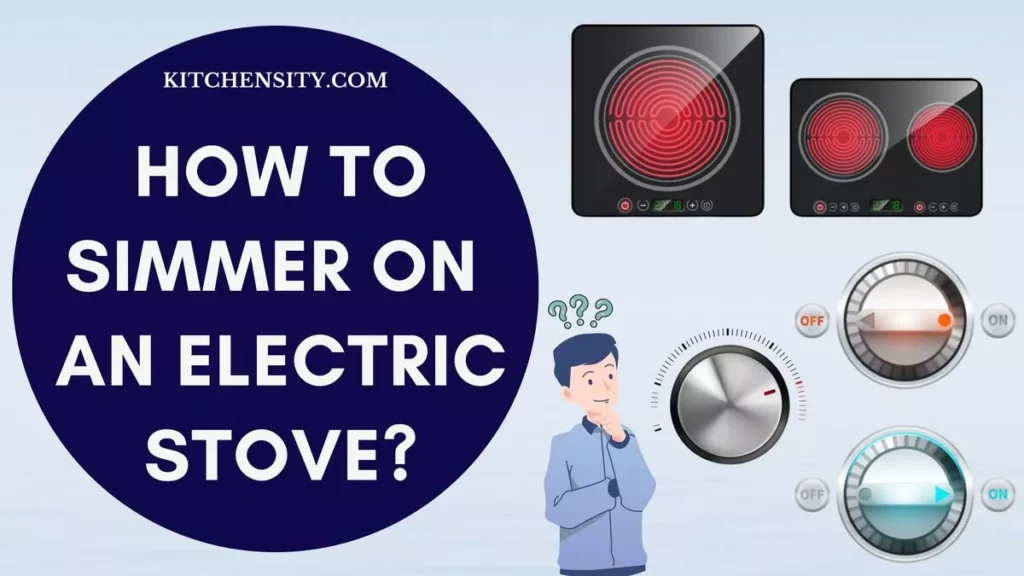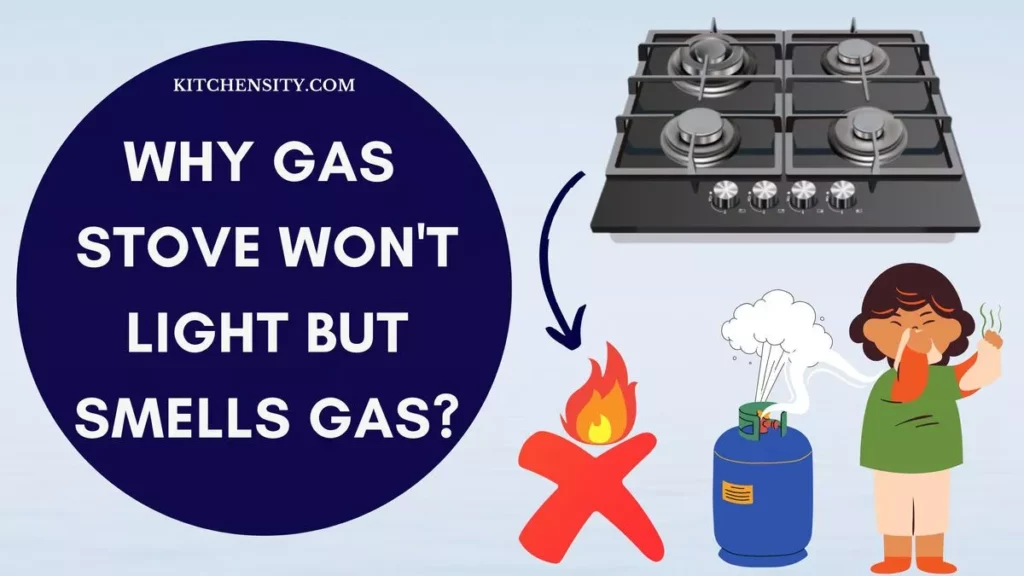In recent years, there has been a growing concern among homeowners about the safety of electric stoves. Many individuals have questioned whether electric stoves can explode, raising alarm bells in kitchens across the globe.
In this article, we will delve deep into the mechanics of electric stoves, exploring the possibility of explosions and addressing the common misconceptions associated with them.
Table of Contents
- 1 Can Electric Stoves Explode?
- 2 What Can Cause An Electric Stove To Explode?
- 3 How Long Does It Take For An Electric Stove To Catch Fire?
- 4 Electric Stove Burner Blows Out
- 5 The Electric Stove Caught Fire
- 6 Electric Stove Coil Fire
- 7 How To Prevent Electric Stove Explosions?
- 8 Can You Overheat An Electric Stove?
- 9 Final Thoughts: Can Electric Stoves Explode?
- 10 Frequently Asked Questions (FAQs)
- 10.1 Can An Electric Burner Cause A Fire?
- 10.2 Can An Electric Stove Explode Without Any Warning Signs?
- 10.3 Frigidaire Electric Stove Burner Blows Out
- 10.4 Is It Safe To Leave An Electric Stove Unattended While Cooking?
- 10.5 Can A Power Surge Cause An Electric Stove To Explode?
- 10.6 Are Electric Stoves More Prone To Explosions Than Gas Stoves?
- 10.7 How Often Should I Have My Electric Stove Inspected For Safety Purposes?
Can Electric Stoves Explode?
Yes, electric stoves can explode but it is an extremely rare occurrence and usually happens due to specific, preventable reasons, such as faulty wiring, damaged components, or improper usage. With proper maintenance, safe cooking practices, and regular inspections, the risk of an electric stove exploding is significantly minimized.
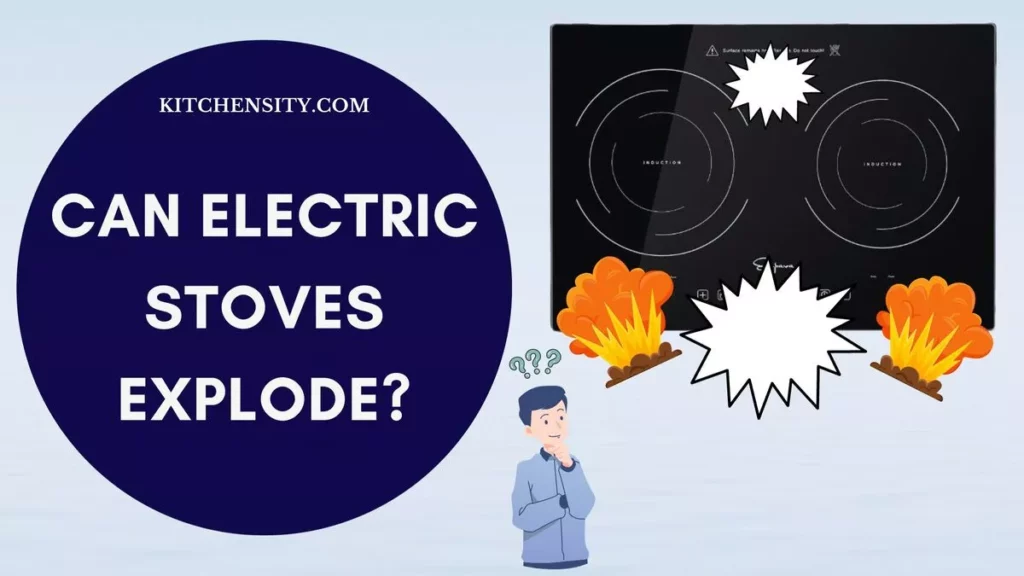
Also Read – Can Gas Stoves Explode?
What Can Cause An Electric Stove To Explode?
An electric stove can potentially explode due to several reasons, although it’s important to note that such incidents are extremely rare.
One common cause is a faulty heating element or coil within the stove. If the heating element malfunctions, it can lead to overheating, sparking, and ultimately, an explosion. Another possible cause is a power surge. If there’s a sudden increase in electrical current, it can overwhelm the stove’s internal components, causing them to fail and potentially explode.
Additionally, if there’s a gas leak near the electric stove, a spark from the stove’s electrical components could ignite the gas, leading to an explosion. Poor maintenance, such as ignoring signs of wear and tear or using damaged power cords, can also increase the risk of malfunctioning and subsequent explosion.
You must follow safety guidelines, perform regular maintenance, and address any signs of malfunction promptly to minimize the risk of an electric stove explosion.
Also Read – How Hot Do Electric Stove Burners Get?
How Long Does It Take For An Electric Stove To Catch Fire?
The time it takes for an electric stove to catch fire can vary depending on several factors, including the condition of the stove, the presence of any faulty components, and the usage patterns. If you are using an electric stove that is well-maintained, in good working condition and used properly, the risk of it catching fire is significantly reduced.
However, if you have a malfunctioning stove with damaged wiring or heating elements, the risk of a fire occurring increases substantially. In such a case, it’s not possible to provide an exact timeframe because it depends on the specific issue. Electrical fires can start relatively quickly if there’s a short circuit or if exposed wires come into contact with flammable materials.
To ensure your safety, it’s essential to regularly inspect your electric stove for any signs of wear and tear, such as frayed wires or scorch marks.
If you notice any unusual smells, sparks, or smoke while using the stove, it’s crucial to turn it off immediately, unplug it, and contact a qualified technician to assess and repair the appliance. Taking these precautions and being vigilant can significantly reduce the risk of an electric stove catching fire.
Also Read – Why Is My Electric Stove Burner Stays On High?
Electric Stove Burner Blows Out
If you find that your electric stove burner has blown out, it can be concerning, but there are steps you can take to address the situation safely.
- First, if the burner blows out while you’re cooking, immediately turn off the stove’s knob to cut off the electricity supply to that burner. This step is crucial to prevent any further issues or potential hazards.
- Next, allow the burner to cool down completely before attempting to fix it. Once it’s cool, carefully inspect the burner and its connection to the stove. Check for any visible damage, such as burnt or frayed wires, and make sure the burner element is securely in place. If you notice any damage, it’s best to replace the faulty burner element to prevent future problems.
- Additionally, if the issue persists or if you’re uncertain about how to handle the situation, it’s advisable to seek assistance from a qualified technician or an electrician. They can assess the problem thoroughly, identify the cause of the issue, and perform any necessary repairs or replacements to ensure the safe functioning of your electric stove.
Remember, your safety is paramount, so it’s essential to exercise caution and seek professional help if you’re unsure about dealing with the problem on your own.
Also Read – Why Gas Stove Won’t Light But Smells Gas?
The Electric Stove Caught Fire
If you ever find yourself in a situation where your electric stove has caught fire, it’s crucial to act swiftly and prioritize safety. Here’s what you should do:
- Stay Calm: The first and most important step is to remain calm. Panic can make the situation more dangerous.
- Turn Off The Power: Immediately turn off the stove’s power by switching off the circuit breaker or unplugging it from the wall. This will cut off the electricity supply to the stove.
- Do Not Use Water: Do not use water to try to extinguish an electrical fire. Water can conduct electricity and make the situation worse.
- Use A Fire Extinguisher: If you have a Class C fire extinguisher designed for electrical fires, use it to put out the flames. Aim the extinguisher at the base of the fire and sweep from side to side.
- Evacuate: If the fire continues to spread or if you’re unable to control it with a fire extinguisher, evacuate the area immediately. Close the kitchen door behind you to contain the fire as much as possible.
- Call For Help: Dial the emergency services (911 or your local emergency number) to report the fire. Even if you manage to extinguish the fire, it’s essential to have professionals assess the situation to ensure there are no hidden risks.
- Do Not Reuse The Stove: After a fire, it’s crucial not to use the stove until it has been inspected and repaired by a qualified technician. Electrical fires can cause hidden damage that may not be immediately visible.
Also Read – How Long Can You Leave An Electric Stove On Without Risking A Fire?
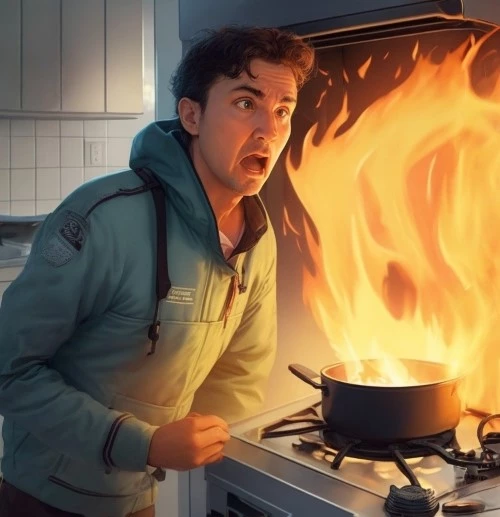
In the event of an electric stove fire, your safety and the safety of those around you should be the top priority. Following these steps can help mitigate the situation and prevent it from escalating.
Also Read – What Happens If You Use Propane On A Natural Gas Stove?
Electric Stove Coil Fire
An electric stove coil fire can be a concerning situation, but it’s essential to handle it calmly and promptly to ensure your safety and the safety of those around you. If you find yourself facing a stove coil fire, follow these steps to effectively deal with the situation.
- Firstly, your immediate action should be to cut off the power supply to the stove. Reach for the stove’s control panel and turn off the burner switch, or if possible, unplug the stove from the electrical outlet. By disconnecting the power, you eliminate the source of electricity to the malfunctioning coil, preventing the fire from worsening due to continued electrical supply.
- After cutting off the power, refrain from using water to extinguish the fire. Water is a conductor of electricity, and using it on an electrical fire can lead to electrocution. Instead, if the fire is small and manageable, attempt to smother it. You can use a metal lid or a larger, flat pan to cover the burning coil completely. By cutting off the oxygen supply, you can effectively put out the flames. Do not use plastic lids or towels, as they can melt and exacerbate the situation.
- If you have a fire extinguisher designed for electrical fires (Class C), use it to douse the flames. Stand at a safe distance, pull the pin, aim the nozzle at the base of the fire, and sweep it from side to side. Make sure to read the instructions on the extinguisher for proper usage.
In case the fire continues to spread rapidly, producing significant smoke, or you are unable to control it within a minute or two, evacuate the area immediately. Close the kitchen door behind you to contain the fire as much as possible. Alert everyone in the vicinity and call emergency services (911 or your local emergency number) to report the fire. Even if you manage to smother the flames, it’s crucial to have professionals assess the situation to ensure there are no hidden risks or damage to the wiring or surrounding structures.
Finally, do not use the stove until it has been inspected and repaired by a qualified technician. Electrical fires can cause hidden damage that may not be immediately visible. It’s essential to have the stove thoroughly examined to prevent future incidents and ensure your safety while cooking.
Remember, staying calm, acting swiftly, and prioritizing safety is key when dealing with an electric stove coil fire.
Also Read – Master Medium Heat On A Stove
How To Prevent Electric Stove Explosions?
Preventing electric stove explosions is crucial for the safety of your home and everyone in it. By following these steps, you can significantly reduce the risk of such incidents:
- Regular Maintenance: Schedule regular inspections by a qualified technician to check the condition of your electric stove. Regular maintenance can identify and address potential issues before they escalate into problems.
- Inspect Power Cords And Plugs: Check the power cords and plugs for any signs of damage, such as fraying or exposed wires. If you notice any issues, replace them immediately to prevent electrical faults.
- Avoid Overloading Circuits: Do not overload electrical circuits by plugging too many appliances into the same outlet. Overloading can lead to overheating and increase the risk of a fire or explosion. Use power strips with built-in overload protection if you need to connect multiple devices.
- Keep Stove Clean: Regularly clean your electric stove to prevent grease and food particles from accumulating. Clean both the surface and the heating elements. Accumulated grease can catch fire when the stove is in use.
- Use Cookware Wisely: Use flat-bottomed cookware that fits properly over the heating elements. Avoid using warped or dented pots and pans, as they may not sit securely on the stove, causing uneven heating and potential hazards.
- Avoid Water Near The Stove: Keep liquids and moisture away from the stove’s electrical components. Water can conduct electricity and increase the risk of short circuits. Wipe up spills promptly and ensure the area around the stove stays dry.
- Install Smoke Alarms: Install smoke alarms in your kitchen and ensure they are in proper working condition. Smoke alarms can alert you to potential issues before they escalate into emergencies, giving you time to react.
- Educate Household Members: Ensure everyone in your household is aware of the safety precautions related to using the electric stove. Teach them about the risks associated with overloading circuits, leaving the stove unattended, and using damaged cookware.
- Invest In A Surge Protector: Consider using a surge protector for your electric stove. Surges in electrical power can damage appliances and increase the risk of malfunctions. A surge protector can help prevent these issues.
- Install A Fire Extinguisher: Keep a Class C fire extinguisher in your kitchen. This type of extinguisher is designed specifically for electrical fires and can be effective in containing a small stove-related fire before it spreads.
- Regularly Check Wiring: Periodically inspect the wiring in your kitchen. Look for signs of wear, damage, or discoloration. If you notice any issues, contact an electrician to assess and repair the wiring.
By following these steps and remaining vigilant, you can significantly reduce the risk of electric stove explosions, ensuring a safer environment in your home.
Also Read – What Temperature Is Simmer On An Electric Stove?
Can You Overheat An Electric Stove?
Yes, it is possible to overheat an electric stove, just like any other electrical appliance. Overheating occurs when the stove operates at a temperature higher than its designed or safe limit for an extended period. While modern electric stoves are equipped with safety features to prevent overheating, there are still factors and situations that can lead to overheating if not managed properly.
One common cause of electric stove overheating is using the stove continuously for an extended period at high temperatures. Prolonged use at the maximum heat setting can cause the heating elements and other internal components to become excessively hot. If the stove is not given enough time to cool down between uses, the accumulated heat can lead to overheating.
Another factor that can contribute to overheating is a malfunctioning thermostat or control switch. If these components fail, they might not regulate the temperature effectively, causing the stove to operate at higher temperatures than intended. Regular maintenance and timely repairs can help prevent such issues.
Additionally, blocked ventilation or airflow around the stove can impede the dissipation of heat, leading to overheating. Items placed too close to the stove or covering the vents can restrict the airflow, causing the internal components to heat up excessively. It’s essential to maintain proper clearance around the stove to ensure adequate ventilation.
Using cookware that does not have a flat bottom or is larger than the stove’s heating element can also cause overheating. Uneven contact between the cookware and the heating element can lead to localized overheating, damaging both the cookware and the stove.
Also Read – Can You Replace Burners On An Electric Stove?
To prevent overheating, it’s important to follow these guidelines:
- Avoid Prolonged High-Heat Cooking: Try not to use the stove continuously at its maximum heat setting for an extended period. If you need to cook for a long time, use lower heat settings intermittently.
- Maintain Proper Ventilation: Ensure that there is adequate space around the stove for proper airflow. Avoid blocking vents and maintain a clear area to dissipate heat effectively.
- Use Suitable Cookware: Use cookware with flat bottoms that match the size of the stove’s heating elements. This ensures even heat distribution and prevents localized overheating.
- Regular Maintenance: Schedule regular maintenance checks to inspect the internal components, thermostat, and control switches. Timely repairs and replacements can prevent overheating caused by faulty parts.
By being mindful of these factors and following proper usage guidelines, you can prevent your electric stove from overheating and ensure safe and efficient cooking in your kitchen.
Also Read – Does A Gas Stove Need A Dedicated Circuit?
Final Thoughts: Can Electric Stoves Explode?
In conclusion, understanding the safety aspects of electric stoves is paramount for a secure cooking environment in your home. Throughout this article, you’ve gained valuable insights into the workings of electric stoves, debunking common myths and learning about preventive measures to ensure their safe usage.
Remember, while the concept of electric stoves exploding might trigger concern, such incidents are extremely rare. By following proper maintenance practices, being cautious about the condition of your stove, and adopting safe cooking habits, you significantly reduce the risks associated with electric stoves. Regular inspections, keeping the stove clean, and using appropriate cookware are essential steps to prevent potential malfunctions.
It’s vital to stay vigilant, practice safety protocols, and address any signs of wear and tear promptly. By doing so, you can enjoy the convenience of electric cooking without unnecessary worry. Electric stoves, when used responsibly and maintained well, offer a reliable and efficient way to prepare your favorite meals safely in the comfort of your home.
Also Read – Orange Flame On The Gas Stove: Causes And Fixes
Frequently Asked Questions (FAQs)
-
Can An Electric Burner Cause A Fire?
Yes, an electric burner can cause a fire if there are faults in the wiring or if it overheats due to prolonged use. Regular maintenance and safe usage can prevent such incidents.
-
Can An Electric Stove Explode Without Any Warning Signs?
No, electric stoves typically show warning signs such as unusual sounds, sparks, or a burnt odor before any major malfunction occurs. Regular maintenance can help identify these signs early.
-
Frigidaire Electric Stove Burner Blows Out
If a Frigidaire electric stove burner blows out, immediately turn off the stove, allow it to cool, and inspect the burner element. Replace it if damaged and ensure proper ventilation to prevent future issues.
-
Is It Safe To Leave An Electric Stove Unattended While Cooking?
It is never advisable to leave any stove unattended while cooking. Accidents can happen unexpectedly, so it’s crucial to stay vigilant and monitor the cooking process.
-
Can A Power Surge Cause An Electric Stove To Explode?
While power surges can damage electronic devices, they are not a common cause of stove explosions. However, it’s essential to use surge protectors to safeguard all electronic appliances.
-
Are Electric Stoves More Prone To Explosions Than Gas Stoves?
No, electric stoves are not inherently more prone to explosions than gas stoves. Both types of stoves have their safety measures, and incidents are rare with proper usage and maintenance.
-
How Often Should I Have My Electric Stove Inspected For Safety Purposes?
It is recommended to have your electric stove inspected annually by a qualified technician to ensure all components are functioning correctly and to identify any potential issues.
🔧 Stove Expert | 🔥 Gas Guru | 🏠 DIY Enthusiast | 🎨 Painter Extraordinaire
John Davis is your go-to source for all things stoves, from expert repairs to maintenance tips. With a deep understanding of gas systems, including natural and propane, John ensures your kitchen stays cooking safely. His passion for DIY home and kitchen projects shines through his stunning paint transformations. Trust John to bring warmth and functionality to your home, one stove at a time.

